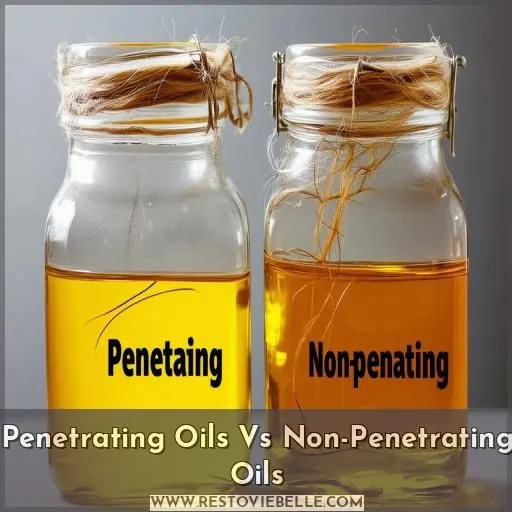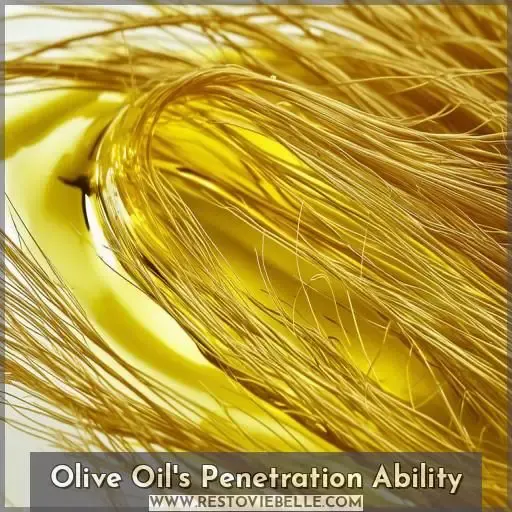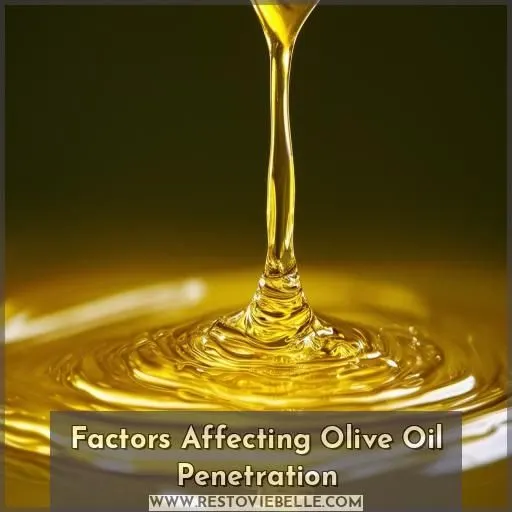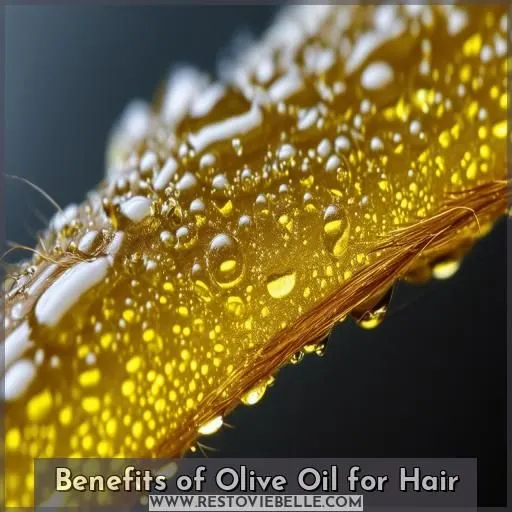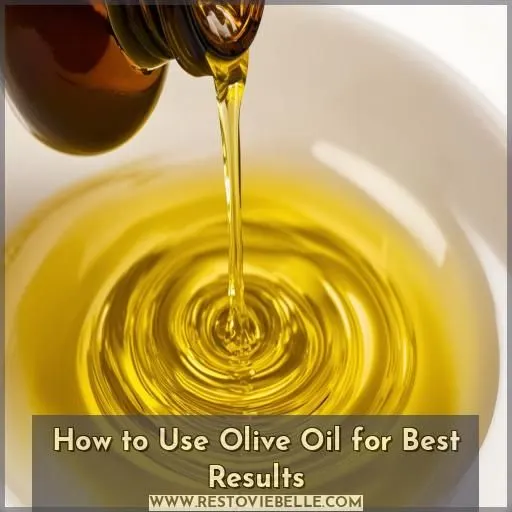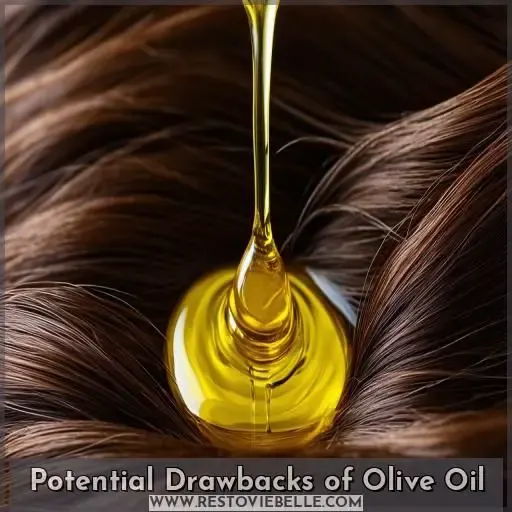This site is supported by our readers. We may earn a commission, at no cost to you, if you purchase through links.
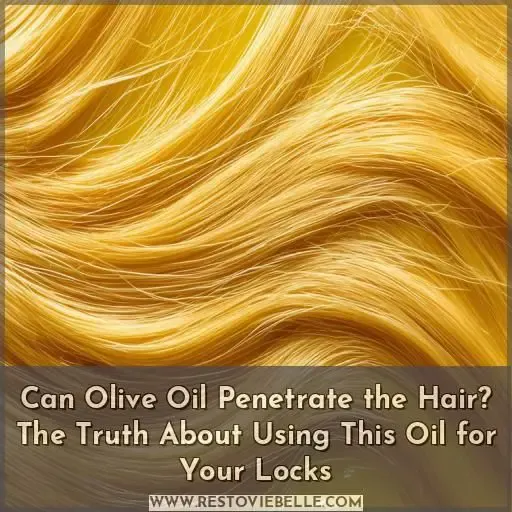 Yes, olive oil can penetrate the hair to some degree.
Yes, olive oil can penetrate the hair to some degree.
While not as effective as oils like coconut oil, olive oil’s oleic acid content allows it to nourish strands from within.
The key is applying it to damp hair and leaving it on for 15-30 minutes before rinsing thoroughly.
Factors like porosity and damage level affect absorption.
So if you have coarse, dry locks, olive oil can help moisturize, reduce frizz, and boost shine.
But take care – too much can weigh down fine hair.
Want to optimize olive oil’s penetration for your specific tresses?
Table Of Contents
- Key Takeaways
- Can Olive Oil Penetrate the Hair?
- Penetrating Oils Vs Non-Penetrating Oils
- Olive Oil’s Penetration Ability
- Factors Affecting Olive Oil Penetration
- Benefits of Olive Oil for Hair
- How to Use Olive Oil for Best Results
- Potential Drawbacks of Olive Oil
- Frequently Asked Questions (FAQs)
- Can I apply olive oil directly on hair?
- Which oils can penetrate the hair shaft?
- How long does it take for olive oil to absorb into hair?
- What happens if you put too much olive oil in your hair?
- Does olive oil penetrate the hair shaft?
- How does olive oil compare to other oils for penetration?
- What factors influence olive oils ability to penetrate hair?
- What are the benefits of olive oil for hair?
- How can olive oil be used for best results on hair?
- Conclusion
Key Takeaways
- While olive oil lacks the penetration power of oils like coconut, its oleic acid content allows it to sneak past your hair’s outer defenses and nourish those thirsty strands from the inside out – a mini vacation for those dry, frizzy locks!
- Putting olive oil to work requires a little finesse. Always apply it to damp hair and focus on those sad, neglected ends before giving it 15-30 minutes to really soak in and work its magic. Then, rinse thoroughly to avoid any oily residue trying to crash the party.
- Like any good relationship, moderation is key when it comes to olive oil and your hair. While it can add brilliant shine and tame frizz, too much of this liquid gold weighs down fine tresses faster than a lead balloon.
- At the end of the day, olive oil offers a tasty one-two punch of moisture and shine to dry, damaged hair in need of some serious TLC. But for those blessed with thick, coarse manes? Consider it your new best friend for frizz-free definition and manageability.
Can Olive Oil Penetrate the Hair?
Yes, olive oil can penetrate the hair shaft to some degree, but it isn’t as effective as other oils like coconut oil. The ability of olive oil to penetrate hair depends on factors such as hair porosity, damage level, and application method .
Penetrating Oils Vs Non-Penetrating Oils
In the realm of hair care oils, discerning the distinction between penetrating and non-penetrating oils is crucial. Penetrating oils, like coconut and sunflower, infiltrate the hair shaft, offering deep nourishment and enhancing elasticity. Conversely, non-penetrating oils, such as mineral and jojoba, create a protective layer on the hair’s surface, increasing luster and minimizing friction.
Oils That Can Penetrate the Hair Shaft
Penetrating oils like coconut, olive, and avocado can seep into your hair shaft, nourishing from within. Their compact structure and slight positive charge allow them to:
- Improve flexibility and definition
- Reduce frizz and drying time
- Enhance overall hair condition and shine
Oils That Sit on the Hair Surface
Oils that sit on the hair surface, like olive oil, are known as sealing oils. These oils have long-chain fatty acids that don’t penetrate the hair shaft. Instead, they form a protective barrier on the hair’s surface, sealing in moisture and preventing frizz. Sealing oils work best for coarse, dry hair types.
| Oil Type | Penetration | Hair Types |
|---|---|---|
| Penetrating | High | Dry, damaged, frizzy |
| Some Penetration | Moderate | Dry, coarse |
| Non-Penetrating | Low | Coarse, dry |
Olive Oil’s Penetration Ability
While olive oil isn’t considered a true penetrating oil like coconut oil, it does have some ability to penetrate the hair shaft to a certain extent. This penetration capacity, although less potent than dedicated penetrating oils, can still provide conditioning benefits like improved moisture and reduced frizz when olive oil is applied properly.
Olive Oil Has Some Ability to Penetrate Hair
Olive oil can penetrate hair to some degree, thanks to its oleic acid content. However, it’s not as effective as coconut oil or other penetrating oils. To maximize absorption, apply olive oil to damp hair, focus on the ends, leave it on for 15-30 minutes, and rinse thoroughly.
Compared to Coconut Oil and Other Penetrating Oils
Olive oil penetrates hair to some degree, but not as effectively as coconut oil and other lauric oils (Source). While olive oil nourishes hair with oleic acid, it may promote dandruff and scalp issues (Source). For culinary benefits and hair beauty, olive oil shines, but coconut oil excels at penetrating processed hair .
| Oil Type | Penetration Level | Hair Benefits |
|---|---|---|
| Coconut | High | Protein loss prevention, moisturizing, shine |
| Olive | Moderate | Moisturizing, shine, reducing frizz |
| Avocado | Moderate | Vitamin A, E, biotin, dandruff reduction |
| Argan | Moderate | Lightweight, suitable for fine hair |
| Jojoba | Low | Scalp soothing, sealing moisture |
Factors Affecting Olive Oil Penetration
Regarding olive oil’s ability to penetrate the hair shaft, your hair’s porosity and level of damage play a significant role. The way you apply olive oil, such as to damp or dry hair, and the amount used can also impact how effectively it penetrates the cuticle.
Hair Porosity
Your hair’s porosity, or ability to absorb moisture, impacts olive oil’s penetration. High porosity hair with raised cuticles readily absorbs oil, while low porosity hair with tightly-sealed cuticles resists oil absorption. Olive oil works best on:
- Dry, damaged hair
- Chemically-treated hair
- Coarse, thick hair textures
Hair Damage Level
Regarding hair damage, it can substantially impact the absorption of olive oil. Damaged hair often has a more porous structure, which may allow better absorption of the oil, leading to improved benefits for conditioning and moisture. However, it’s important to note potential drawbacks, such as the possibility of buildup and weighing down of thin hair. The effectiveness of olive oil for hair care relies heavily on the hair’s condition.
| Factors Affecting Olive Oil Penetration | Description |
|---|---|
| Hair Porosity | Determines how well olive oil can penetrate the hair shaft |
| Hair Damage Level | A significant factor affecting penetration, potentially influencing conditioning benefits |
Application Method
When applying olive oil, consider the following techniques for excellent penetration:
- Apply to damp hair to facilitate absorption.
- Concentrate on the hair ends for intensive nourishment.
- Leave on for 15-30 minutes to allow the oil to penetrate effectively.
- Rinse thoroughly to remove excess oil and potential buildup.
Benefits of Olive Oil for Hair
Olive oil can benefit your hair by moisturizing and reducing frizz, thanks to its oleic acid and squalene content that penetrate the hair shaft to some degree. It also improves shine by smoothing the outer cuticle and acting as a lubricant, although its penetrating ability is lower compared to oils like coconut oil.
Moisturizing
Olive oil’s emollient properties deeply moisturize hair, forming a protective barrier to seal in hydration and prevent breakage, split ends, and frizz (Source). Avocado oil provides similar benefits . Regular use leaves hair soft, smooth, and manageable.
| Moisturizing Benefits | Olive Oil | Avocado Oil |
|---|---|---|
| Emolliency | ✓ | ✓ |
| Hair Protection | ✓ | ✓ |
| Breakage Prevention | ✓ | ✓ |
| Split End Reduction | ✓ | ✓ |
| Frizz Control | ✓ | ✓ |
Reducing Frizz
To combat frizz, olive oil provides moisture, reducing frizz-causing dryness. Its ability to penetrate moderately helps strengthen strands, reducing breakage. The oil enhances shine, adding a protective layer to damaged hair without weighing down hair due to its lightness.
Improving Shine
Olive oil’s fatty acids and antioxidants can enhance shine, reduce frizz, and improve hair elasticity. Apply a small amount to damp hair, focusing on ends, for a glossy, healthy-looking finish. Olive oil is a natural shine enhancer for all hair types.
How to Use Olive Oil for Best Results
To get the most out of olive oil for your hair, apply it to damp strands and focus on the ends, which tend to be the driest parts. Allow the oil to sit for 15-30 minutes before rinsing thoroughly; this gives the olive oil time to penetrate the hair cuticle and provide nourishing moisture.
Apply to Damp Hair
When using olive oil for hair care, applying it to damp hair facilitates absorption. Techniques vary based on hair porosity and desired penetration depth. Incorporate into your hair care routine effectively.
- Understand your hair’s porosity level to determine how much olive oil to apply.
- Ensure uniform distribution of the oil from roots to tips for thorough penetration.
- Allow the oil to sit on damp hair for the recommended time to maximize its benefits.
Focus on Ends
Focus olive oil application on your hair ends to maximize penetration and absorption, avoiding direct scalp application which can lead to buildup and irritation.
| Tip | Explanation |
|---|---|
| Concentrate on ends | Hair ends are drier and more porous, allowing better olive oil absorption. |
| Avoid scalp application | Olive oil can clog follicles and cause buildup on the scalp. |
| Use a small amount | A little goes a long way, preventing greasy residue. |
| Distribute evenly | Ensure even coverage from mid-lengths to ends for satisfactory results. |
Leave on for 15-30 Minutes
After applying olive oil to damp ends, leave it in for 15-30 minutes. Heat application can enhance penetration. Adjust time based on hair type and frequency of use.
Rinse Thoroughly
After 15-30 minutes, rinse olive oil thoroughly to prevent buildup, especially if your hair is fine or damaged. Adjust application based on porosity and damage level for best results.
Potential Drawbacks of Olive Oil
While olive oil offers moisturizing benefits for hair, it’s important to be mindful of potential drawbacks. Olive oil can weigh down fine hair textures and may be difficult to completely wash out, leading to buildup over time.
Can Weigh Down Fine Hair
Olive oil, despite its moisturizing benefits, can weigh down fine hair due to its richness. While its penetration ability is limited, it offers moisture benefits. Opt for sparing application on hair ends to avoid heaviness and benefit from its moisturizing properties .
Difficult to Wash Out Completely
Olive oil can be stubborn to fully rinse out, potentially leading to residue buildup on hair and scalp. Thorough rinsing and using a clarifying shampoo helps minimize issues like irritation and breakage from excess oil.
- Olive oil residue can linger
- Proper hair rinsing is key
- Oil buildup may cause irritation
- Clarifying shampoo helps remove excess
- Avoid breakage from too much oil
Potential for Buildup
Olive oil’s heavy nature can lead to residue buildup, especially on fine or low-porosity hair. Avoid excess application and focus on ends. Clarify regularly to prevent product buildup and maintain healthy hair texture.
| Hair Porosity | Oil Absorption | Buildup Risk |
|---|---|---|
| Low | Minimal | High |
| Medium | Moderate | Moderate |
| High | Significant | Low |
Frequently Asked Questions (FAQs)
Can I apply olive oil directly on hair?
Like a nourishing elixir, olive oil can revive thirsty tresses – but apply wisely. While safe for hair ends, use caution nearing roots; its richness risks leaving behind an unwanted, greasy trail. Moderation releases olive oil’s rejuvenating powers.
Which oils can penetrate the hair shaft?
Penetrating oils like coconut, ucuuba butter, sunflower, and palm kernel can enter the hair shaft, improving flexibility and reducing frizz. Olive, avocado, corn, and canola oils have some penetration ability too.
How long does it take for olive oil to absorb into hair?
While the jury’s still out on how deeply olive oil penetrates, it likely takes a few hours to fully absorb into your strands. For best results, apply it to damp hair and let it sink in overnight before shampooing out.
What happens if you put too much olive oil in your hair?
If you apply too much olive oil to your hair, it can make your strands look greasy and weighed down. The excess oil may also be difficult to rinse out completely, leaving residue behind.
Does olive oil penetrate the hair shaft?
While olive oil doesn’t fully penetrate the hair shaft, its fatty acids can temporarily fortify and smooth the outer cuticle layer. However, you’ll get longer-lasting benefits from oils like coconut that absorb into the hair’s inner cortex.
How does olive oil compare to other oils for penetration?
Unlike coconut or sunflower oils that penetrate hair, olive oil sits on top. It coats strands for shine rather than deeply conditioning.
What factors influence olive oils ability to penetrate hair?
Olive oil’s ability to penetrate hair depends on its chemical composition, specifically the ratio of monounsaturated to saturated fatty acids. Higher monounsaturated content enhances penetration into the hair shaft for deeper conditioning.
What are the benefits of olive oil for hair?
When it comes to olive oil benefits, you’re in luck – it’s a hair health powerhouse! This versatile oil moisturizes strands, reduces breakage, and adds shine like a champ.
How can olive oil be used for best results on hair?
Use olive oil on your hair ends only. Apply a small amount, let it absorb for 15-30 minutes, then rinse thoroughly. Avoid your scalp to prevent buildup or irritation. Repeat weekly for best moisturizing results.
Conclusion
Like a skilled artisan, you can harness olive oil’s ability to penetrate the hair and nourish your locks from within.
While not as potent as coconut oil, its oleic acid content allows it to permeate strands, especially if you have coarse, dry hair.
Apply it to damp tresses.
Let it absorb for 15-30 minutes.
Then rinse thoroughly to reap the moisturizing, frizz-reducing, and shine-enhancing benefits of this versatile oil.
